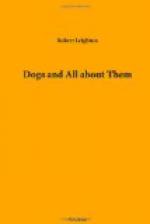over the back and carried flat and straight, being
profusely covered with long, harsh, spreading hair.
COAT—There should be two coats, an undercoat
and an overcoat; the one a soft fluffy undercoat, the
other a long, perfectly straight coat, harsh in texture,
covering the whole of the body, being very abundant
round the neck and fore part of the shoulders and
chest where it should form a frill of profuse standing
off straight hair, extending over the shoulders.
The hind-quarters should be clad with long hair or
feathering, from the top of the rump to the hock.
COLOUR—All whole colours are admissible,
but they should be free from white or shadings, and
the whites must be quite free from lemon or any other
colour. A few white hairs in any of the self
colours shall not necessarily disqualify. At present
the whole coloured dogs are:—White, black,
brown (light or dark), blue (as pale as possible),
orange (which should be as deep and even in colour
as possible), beaver, or cream. Dogs, other than
white, with white foot or feet, leg or legs, are decidedly
objectionable and should be discouraged, and cannot
compete as whole coloured specimens. In parti-coloured
dogs the colours should be evenly distributed on the
body in patches; a dog with white or tan feet or chest
would not be a parti-colour. Shaded sables should
be shaded throughout with three or more colours, the
hairs to be as “uniformly shaded” as possible,
with no patches of self colour. In mixed classes
where whole coloured and parti-coloured Pomeranians
compete together, the preference should, if in other
points they are equal, be given to the whole coloured
specimens. Where classification is not by colours
the following is recommended for adoption by show
committees:—1. Not exceeding 7 lb.
(Pomeranian Miniatures). 2. Exceeding 7 lb. (Pomeranians).
3. Pomeranians and Pomeranian Miniatures mixed.
* * * *
*
The early type of a Pomeranian was that of a dog varying
from 10 lb. or 12 lb. weight up to 20 lb. weight,
or even more, and some few of about 12 lb. and over
are still to be met with; but the tendency among present-day
breeders is to get them as small as possible, so that
diminutive specimens weighing less than 5 lb. are now
quite common, and always fetch higher prices than
the heavier ones. The dividing weight, as arranged
some ten years ago by the Pomeranian Club, is 8 lb.,
and the Kennel Club has recently divided the breed
into two classes of Pomeranians and Pomeranians Miniature.
As a rule the white specimens adhere more nearly to
the primitive type, and are generally over 8 lb. in
weight, but through the exertions of many breeders,
several are now to be seen under this limit.
The principal breeders of this colour in England to-day
are Miss Hamilton of Rozelle, Miss Chell, Miss Lee-Roberts,
Mrs. Pope, and Mrs. Goodall-Copestake. The first
two whites to become full champions under Kennel Club
rules were Rob of Rozelle and Konig of Rozelle, both
belonging to Miss Hamilton of Rozelle.




